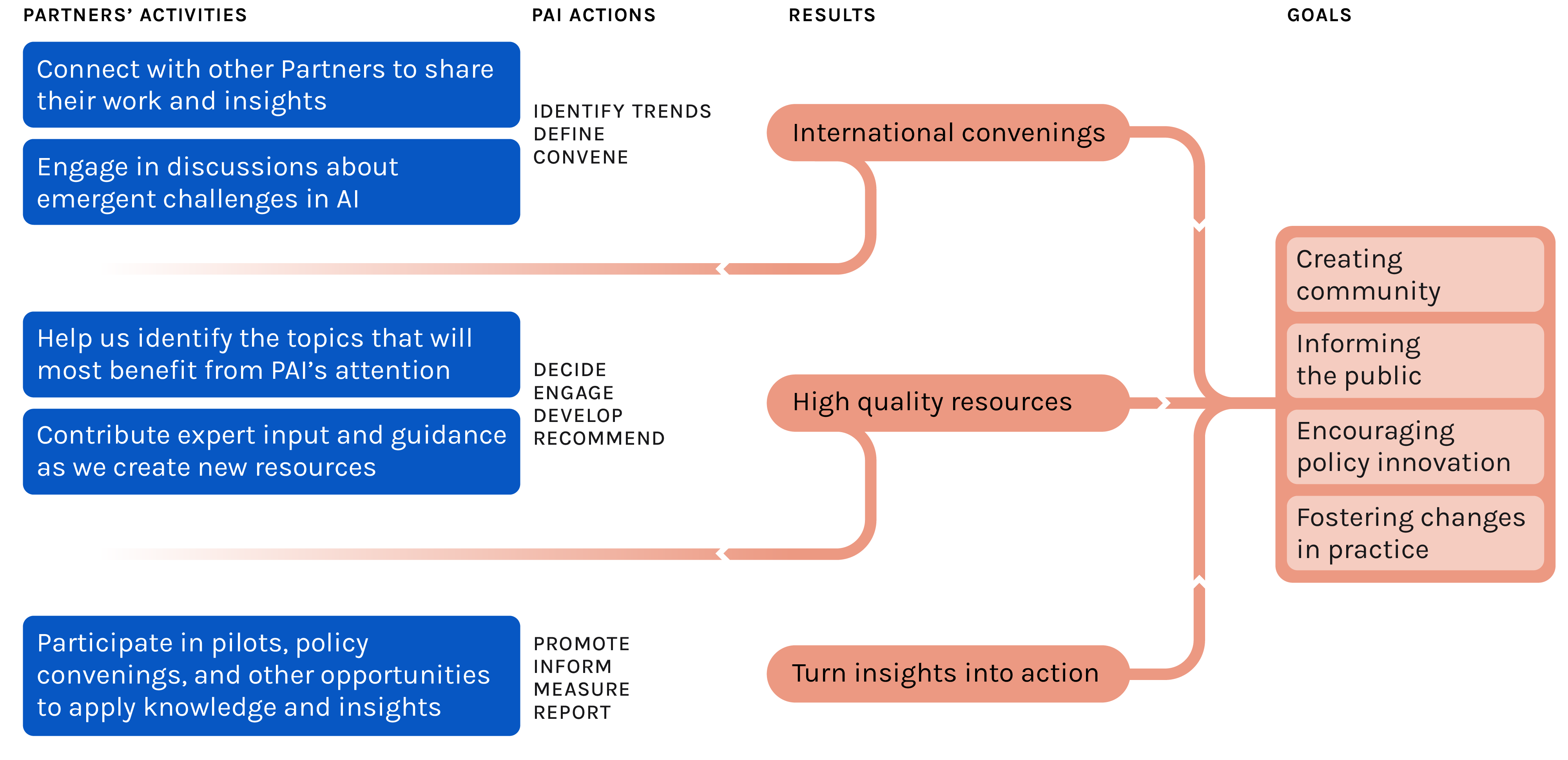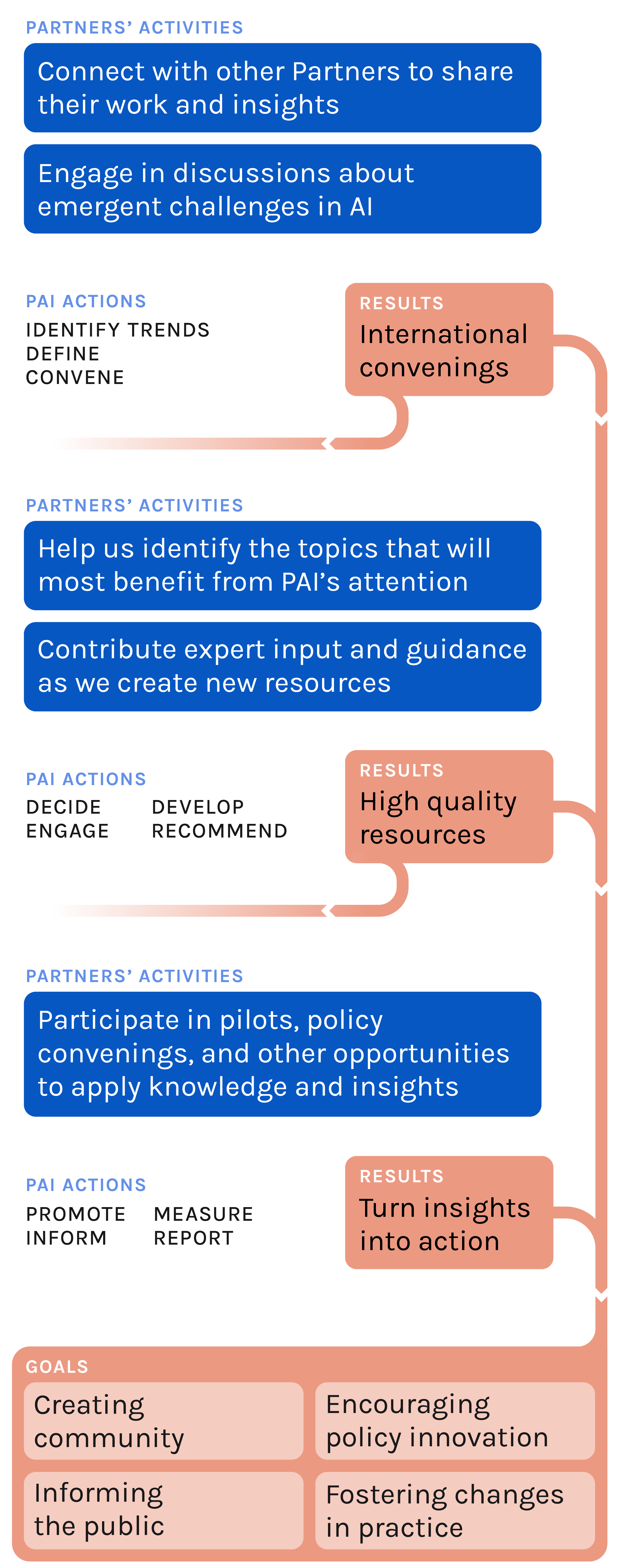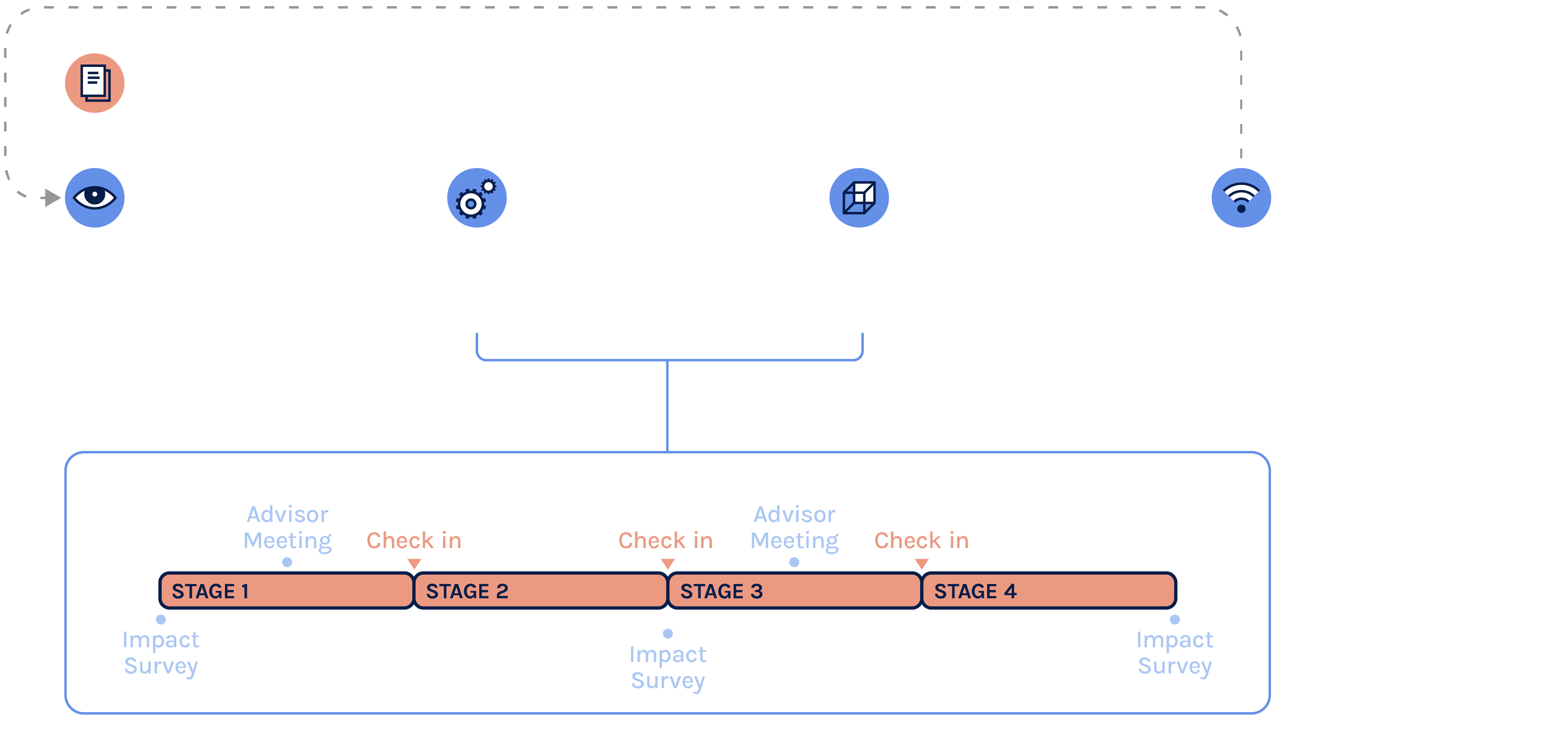Our Approach
Partnership on AI is working to advance responsible governance and best practices in AI, addressing the most important challenges related to the use of these technologies and helping guide efforts in AI to enhance the quality of peoples’ lives.
By bringing together our Partners and diverse voices from across the AI community and around the world, PAI seeks to not just spark new ideas but to turn those ideas into lasting change. PAI was founded on the belief that multistakeholder community-building is critical to ensuring that AI benefits people and society.
Theory of Change
PAI’s Theory of Change, developed in consultation with our nearly 100 Partners worldwide, identifies three key Results from our work that will define our success moving forward. Central to this success is convening stakeholders — Partners, expert voices, policymakers and others that are part of the AI ecosystem — to identify issues, create resources, and turn insights into action through pilot projects and other real-world applications.


Engaging Our Partner Community
It is only through the dedication of our Partners that we can create the change we believe in. Our Partnership includes academic, civil society, industry, and media organizations from across the globe. This community of practice drives our work forward and makes us all accountable for achieving intended results. In addition, we seek opportunities to collaborate beyond the Partnership in efforts to advance public understanding of AI issues as well as innovations in public policy.
Some key ways Partners can engage with PAI’s work are through:
Quarterly Program Meetings
Our quarterly, Partner-only Program Meetings serve as an opportunity for Partners to stay up-to-date on Program activities and also engage with other members of the Partnership.
Steering Committees
Program and Workstream Steering Committees consist of small groups of invited Partners and other experts who meet on a consistent basis to inform our work.
Program Workshops
Workshops are regularly convened to explore questions posed by our Programs and support their work.
Partner-wide Meetings
Partner-Wide Meetings bring together our diverse partner community to learn about and inform PAI’s work as a whole. Thanks to the breadth of our community, these are unique, invaluable opportunities to collaborate and learn from each other.
Participate in a Pilot
To better understand how our recommendations can be applied in practice, PAI works with Partners and others on Pilots that deploy these recommendations in real-world settings.
Participating organizations assess current practices, determine which systems are appropriate to improve, and then report on collaborative efforts to improve these systems.
By gathering feedback, analyzing results, and measuring the impact of Pilots, PAI collects findings that help us build a curriculum of templates, tools, and other resources to make our guidance repeatable and scalable.
Pilot Process


Determining Priorities
PAI has identified clear criteria for selecting appropriate topics of our convenings and workstreams:
1. PAI’s Multistakeholder Model
Topic requires the inclusion of diverse perspectives from PAI’s community of civil society and media experts, researchers based at academic institutions and think tanks, policy-makers, scientists and engineers from technology companies, and those most harmed or at risk of harm from AI.
2. Fundamental Sociotechnical Challenge
Topic requires an important, consequential and complex challenge where there may be significant difference of perspectives that would benefit from meeting and learning from each other. While it may be an emerging challenge, there is risk to people and society in not catalysing or developing an agenda for action.
3. Connects with AI research and technology expertise
There is a need for AI researchers or technologists at technology companies to bring their expertise to the topic and learn from individuals in other sectors through an open dialogue and commitment to equity.
1. There is a clear space for action and intervention with our Partners
We have identified with our Partners that we have the right capacity, skills, access to the required experts and data needed to make recommendations; we can coalesce the right stakeholders to work in this area.
2. We believe the issue needs our public voice
The topic is one where PAI, as a non-profit, multistakeholder organization could have something concrete to say in the public interest.
3. It coheres with our portfolio of work
It fills a need or gap in our project mix based on our expertise, ongoing issue spotting and the changing environment within which we work, allowing us to be proactive, agile and opportunistic when needed.
4. It builds our capacity for global impact and reach
Partners are committed to the workstream (e.g. funding, engagement). There is potential for recommendations to be adopted by Partners, to inform public policy-makers and advance understanding with the public.
Measuring Success
PAI will measure our success based on the ability to achieve the following results identified in our Theory of Change which align with our vision and mission:
Important, timely convenings with diverse stakeholders across the world, including experts in relevant areas and people at highest risk of being harmed by AI applications
- PAI is unique in its ability to bring together a diverse community of individuals and organizations from civil society and the media, along with, AI scientists and engineers from leading technology companies, researchers based at academic institutions and think tanks, and those most harmed or at risk of harm from AI, to have in-depth conversations about emerging, timely and important developments, sparking new connections and collaborations.
Influential, high quality, accessible, relevant PAI resources, tools and recommendations
- Drawing on our convenings and ongoing work with our Partners and those potentially harmed by AI applications, we will develop a broad set of resources, tools, and recommendations that synthesize knowledge and make complex topics accessible and relevant.
Public reports that demonstrate impact and progress in Partner practice and policy, as well as public policy and understanding
- PAI will issue regular reports highlighting case studies of progress and collective action. Our goal is to provide greater public accountability for the responsible development and deployment of AI, and advance action and understanding by PAI Partners, public policy makers and the broader public.
Impact
By focusing on achieving these results, PAI intends to contribute to the following outcomes in the broader AI ecosystem:
Stay Informed
Ways to engage and stay informed:
Events
Please see our Events page to learn about both our upcoming events as well as where PAI staff members are speaking externally.
In the Media
Catch up on the latest PAI news, recent media coverage, podcast appearances, and more on the PAI press page.
Programmatic Updates
Sign-up to receive updates on PAI Programs.

